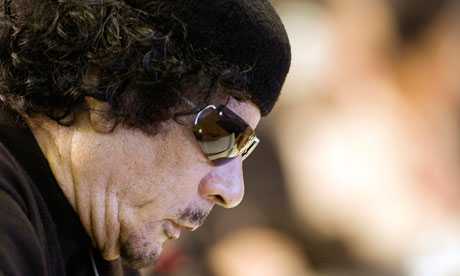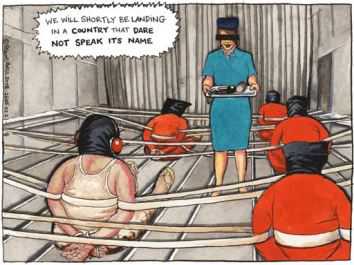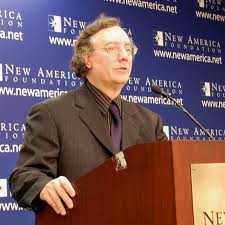By MARC CHAMPION
ISTANBUL—Turkey is showing signs of trading its vaunted “zero problems with neighbors” foreign policy for a more muscular approach to its bid to become the leading power in the Middle East and North Africa.

Prime Minister Recep Tayyip Erdogan and members of his new cabinet visiting the mausoleum of Ataturk, the founder of modern Turkey, in July.
The shift, analysts and diplomats say, could trigger clashes with Israel and force Washington to choose between its closest allies in the region.
In recent weeks the policy change has been on display as Prime Minister Recep Tayyip Erdogan threatened to deploy his country’s navy in a dispute with Israel, approved a major aerial bombing campaign against Kurdish rebels in northern Iraq and pressed Egypt to let him make a politically provocative visit to Hamas-run Gaza.
A Turkish cabinet minister also threatened that Turkey would use its navy to prevent Cyprus and Israel from developing offshore natural gas fields without the involvement of Turkish-backed Northern Cyprus.
On Monday, Mr. Erdogan departs for high-profile visits to Egypt, Tunisia and Libya—three core battlegrounds in the wave of popular revolutions that have swept the Arab world in the past year.
Turkey isn’t shifting from soft power to hard, says Ibrahim Kalin, senior adviser to Mr. Erdogan, but is using “smart power” by turning to force where necessary. “The soft power is still there,” he says.
The Arab Spring forced Turkey to retool its foreign policy, analysts and diplomats say, after the revolutions rocked the regimes of Syrian President Bashar al-Assad and Libya’s Col. Moammar Gadhafi—partners in Turkey’s “zero problems” approach—and for a time put Ankara in conflict with popular Arab sentiment.
Mr. Assad’s crackdown also drove Ankara into more direct competition with Syrian ally Iran, whose regime Turkey had courted assiduously. Last week, Ankara agreed to host the forward radar for a North Atlantic Treaty Organization missile-defense system directed at Iran.
While the Obama administration has expressed alarm over the confrontational approach to Israel, U.S. officials said they have been coordinating closely with Turkey in responding to political upheavals in Arab countries—and Washington views Ankara as central to any efforts to stabilize the Mideast.
Turkish officials see the Arab upheavals of 2011 as playing to Turkey’s strengths as a model Muslim democracy. They say their “zero problems” policy remains in tune with the Arab Spring, because it shares the same values as the protesters.
The officials now feel ready to press those advantages with Mr. Erdogan’s trip next week. “We have made it clear we never had any kind of imperial intentions, but there is demand from the Arab street,” Mr. Kalin said in a phone interview on Thursday.
How much Turkish leadership Arab leaders will accept remains an open question. Mr. Erdogan pushed hard, for example, to secure Egyptian permission to cross its border into Gaza, where he would likely receive a hero’s welcome for his vocal opposition to Israeli policy. Egypt so far appears to have refused permission for the trip.
So far there is little sign that Israel will bow to threats and meet Turkey’s demand that it should apologize for the deaths of nine people in the seizure of the Gaza-bound Mavi Marmara ship in May 2010.
Nor does Cyprus appear to be rushing to compromise in reunification talks, while Syria’s President Assad has so far rebuffed pressure to reform from Ankara, as well as from other capitals. Israel sees Turkey’s campaign for an end to the blockade of Gaza as part of a strategic decision to gain prominence in the Muslim world at the expense of their old strategic alliance.In Iran, ex-justice minister Ayatollah Hashemi Shahroudi complained that Turkey is promoting “liberal Islam.”
The policy shift doesn’t have universal appeal at home, either. Turkey’s main opposition party leader Kemal Kilicdaroglu caused a storm of protest from government officials on Wednesday when he said Turkey’s foreign policy had turned from one of zero problems to “zero gains.”
For now though, surveys suggest Mr. Erdogan is the most popular leader in the Middle East.
In Egypt, a new zeal for revolutionary change has cast Mr. Erdogan’s more confrontational attitude toward Israel and his moderate approach toward political Islam as a model for the democratic experiment. Activists are reportedly planning a welcome party to greet Mr. Erdogan’s arrival.
Egyptian foreign-policy institutions are less likely to look to Turkish regional leadership with the same enthusiasm, said an official in Egypt’s ministry of foreign affairs. “Egypt is not in the business of following,” he said.
Mr. Erdogan, in a speech at Cairo University on Monday, will set out Turkey’s vision for the region’s future, one defined by “not occupation, not authoritarianism, not dictatorship,” said Mr. Kalin.
Mr. Erdogan will also sign bilateral energy and other economic agreements, attend a high-level joint political-security council, meet representatives of the prodemocracy movement and address a meeting of Arab League foreign ministers, according to Mr. Kalin.
Yet Mr. Erdogan’s outreach to the Arab world comes with a visibly tougher approach to foreign policy. That includes a series of warnings to Cyprus and Israel in recent days against drilling offshore for natural gas without the involvement of Turkish-backed Northern Cyprus.
“That’s what naval forces are for,” Egemen Bagis, Turkey’s Europe minister told the Sunday’s Zaman newspaper.
“In this game of brinksmanship accidents can happen, not least because parts of the Israeli government are prone to high risk-taking,” says Professor Ilter Turan, professor of international relations at Istanbul’s Bilgi University.
Mr. Turan sees the Turkish government’s more aggressive stance as part of a wider confidence that is the result of the ruling Justice and Development Party’s sweeping re-election in June.
In a sign of that confidence, Ankara—once careful to court the European Union—this summer threatened to freeze relations with the bloc over Cyprus reunification talks.
Then, in August, Turkey’s once all-powerful generals effectively admitted defeat in a power struggle with the government; a new slate of top commanders appears to have accepted civilian control, boosting government confidence.
It isn’t clear how far Turkey will go. For example, while Ankara has threatened to send out naval patrols, it has yet to do so. The assault on bases of the outlawed Kurdish Workers’ Party, known as the PKK, is only the first in several years and hasn’t expanded into a land campaign.
According to Henri Barkey, Turkey specialist and professor of international relations at Lehigh University, Pennsylvania, Turkey is using the latest conflict with Israel in “a bid to recover lost prestige in the Arab world” after the Arab Spring. At the same time, he said, Ankara is bidding for regional leadership and challenging the U.S. to choose between its two closest regional allies.
“It’s a very high stakes approach, but they are also very confident,” he said.
—Joshua Mitnick in Tel Aviv, Matt Bradley in Cairo and Jay Solomon in Washington contributed to this article.
https://www.wsj.com/articles/SB10001424053111904103404576558511184832354





